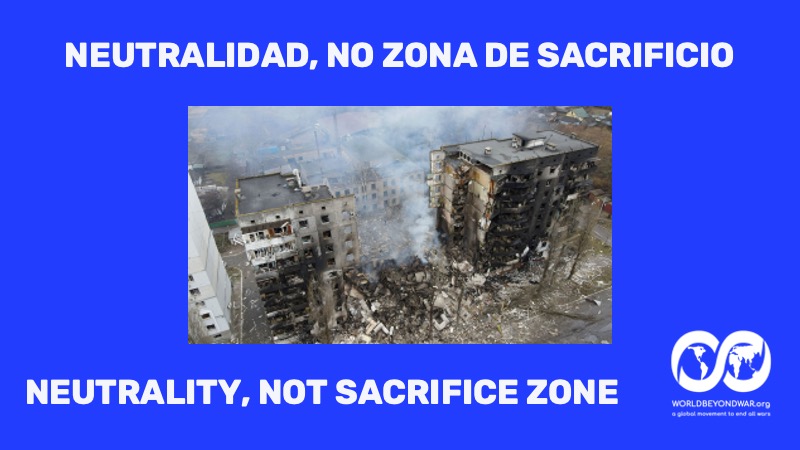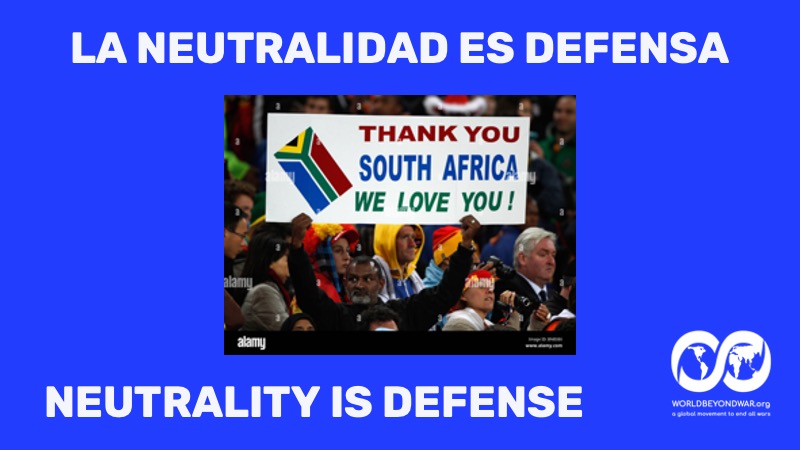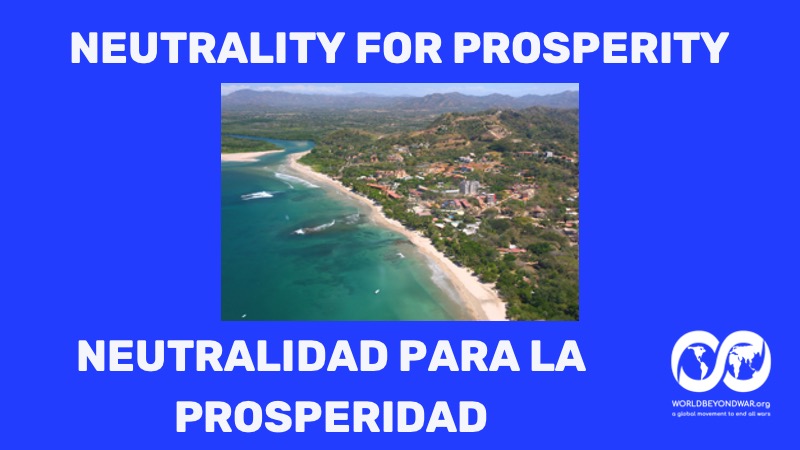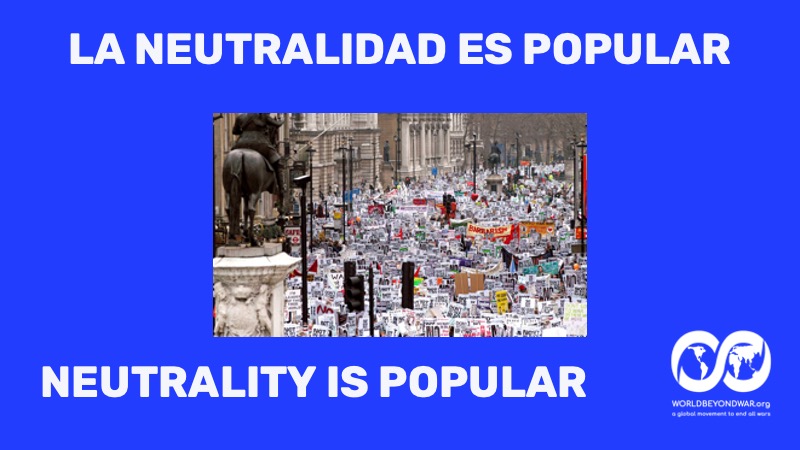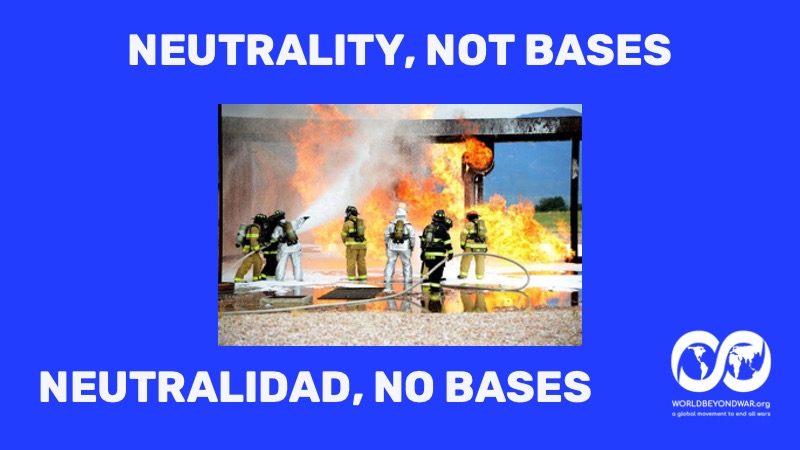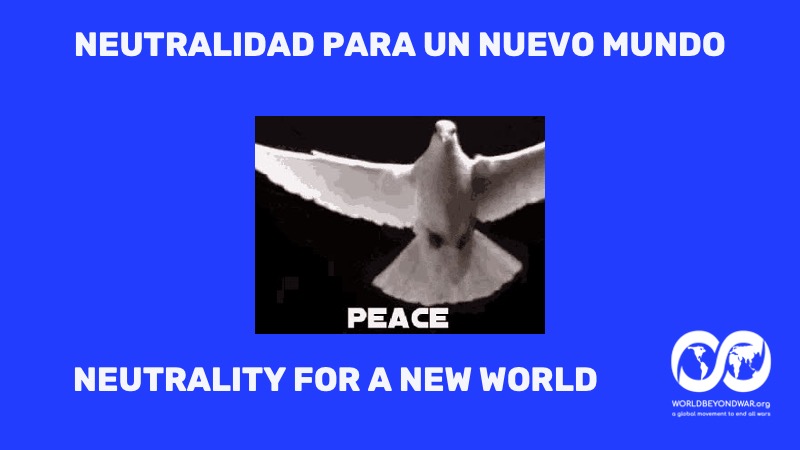By David Swanson, World BEYOND War, April 4, 2024
Remarks at Neutrality Congress, held April 4-6 2024 at Congress of the Republic of Colombia, Bógota, Colombia
NOT NEUTRALITY ON EVERYTHING
The brilliant and wonderful late U.S. historian Howard Zinn wrote that you cannot be neutral on a moving train. We all agree, I’m sure, that in the face of injustice, one should not be neutral, that silence and inaction are means of supporting those committing wrongs, that as was said by the late Dr. Martin Luther King Jr. (who was murdered 56 years ago today), silence is betrayal. But Zinn and King did what they could to get nations to stay out of wars.
NEUTRALITY ON WAR
To be neutral on war means not to engage in or support or facilitate a backward and barbaric practice that kills, injures, destroys, traumatizes, makes homeless, fuels hatred, tears down the rule of law, devastates the natural environment, diverts needed resources from environment and health and education and housing and food, impedes global cooperation on emergencies, leaves both sides worse than before, and risks nuclear apocalypse.
NEUTRALITY BECAUSE WE HAVE IMPORTANT THINGS TO DO
As President Gustavo Petro said at the United Nations last year, “While the minutes that define life or death on our planet are ticking on, rather than halting this march of time and talking about how to defend life for the future, thanks to deepening knowledge, . . . we decided to waste time killing each other.”
NEUTRALITY BETWEEN LUNATICS
So what does it mean to be neutral on war? We call it being neutral, because we mean not jumping in on either side of the murderous madness. We don’t call it indifference. If two speakers at this conference were to have a little disagreement and decide to settle it by shooting pistols at each other from ten paces apart in an old-fashioned duel, I assume the rest of us would not jump in and assist either side. But neither would we be indifferent. We would try to talk the two people out of their mad endeavor. We would ask them to join us in the 21st century where we view such things, not as honorable and noble, but as screwball and psychotic.
NEUTRALITY OVER NUCLEAR
Most humans who have ever lived have not known war. Most humans in the most warmaking nations do everything they can to avoid war. Most human societies have not known war. Many have not known even murder, even anger. If we come to understand war as not only screwball and psychotic, but also as putting at risk all life on Earth, then we can advocate for neutrality but not indifference — for a refusal to support either side, but also an invitation to both sides to join us in the 22nd century, which will likely never come to be unless war is abolished.
NEUTRALITY IS NOT ENMITY
We cannot be indifferent to war because we cannot be indifferent to war thinking, in which neutrality is almost incomprehensible. For many supporters of wars, especially while in the grip of high passion, failure to support their side simply means supporting the other side. The idea is foreign to them that there can be a coherent and constructive program that involves supporting both peoples while opposing the mass murder and destruction being done by both governments. As people begin to think about such a strange concept, they often leap to the bizarre idea that if you oppose both sides of a war you are declaring both sides equal and identical. But of course most recent wars have been extremely one-sided slaughters. The blame has not been distributed equally. And yet, the path to a safe and sustainable world very clearly does not lie in joining the proper sides of wars. Rather it is to be found in moving the world beyond warmaking entirely.
NEUTRALITY IS NORMAL
Most nations are neutral on most wars. It’s not difficult. When the U.S. government tried to forbid neutrality on the war in Ukraine, much of the world refused that demand. Neutrality is not difficult when a war is distant and disconnected. The need is for neutrality applied universally, neutrality on all wars, near and far. Nations not ready to follow the wisdom of Costa Rica and abolish their militaries, and governments too afraid of their own people to train them in unarmed civilian resistance, will want to make an exception for defensive wars. And though we all know how preparation for defensive wars tends to lead to wars and also to the militarization of domestic society — and though we all know that indigenous groups have defended their land without war, and that peoples have overthrown dictators without war — allowing that exception for defensive wars could still mean a huge step in the right direction.
NEUTRALITY, NOT EMPIRE
The choice facing many countries is not neutrality or militarization, but neutrality or incorporation into a foreign empire and its global war machine, neutrality or subservience to a global Monroe Doctrine. Most military spending on Earth is done by the United States and its NATO members and partners. There are few candidates left for this global force to be opposed to, to bait into arms races, to use as justifications for its own existence. The U.S. government spends more on its own military than all but 3 other nations combined and exports more weaponry than all but 2 other nations combined. Since 1945 the U.S. military has fought in 74 nations. Of all the military bases on foreign soil, 90% of them are U.S. bases. During the war on terrorism in Africa, we have seen a 75,000% increase in terrorism. There are a lot of bad actors in the world, but the U.S. war machine is so dominant, and so counter-productive, that choices boil down to joining it and be pushed into wars or staying out of it and maintaining some sort of peacefulness, some independence, some self-respect.
NEUTRALITY, NOT NATO
Partnering with NATO means endorsing the horrors that NATO has committed in Bosnia and Herzegovina, Kosovo, Serbia, Afghanistan, Pakistan, and Libya. In the United States NATO is used as a cover for crimes. The U.S. Congress cannot investigate U.S. crimes if they’re labeled NATO crimes. There will be more of them. They are how NATO justifies its existence.
NEUTRALITY, NOT HYPOCRISY
There is no war of democracies and rule-supporters against dictatorships. It doesn’t exist. The U.S. arms, trains, and/or funds the militaries of most of the worst governments on Earth. The U.S. is the fiercest opponent of international laws and basic human rights treaties, and abuser of the veto in the UN Security Council. The United Nations allows genocide because the U.S. government forces it to. (But finally the U.S. stepped aside and allowed a ceasefire vote, but promised to ignore it.) You cannot enlist on the side of both the U.S. government and the rule of law. Better than joining NATO would be joining the Treaty on the Prohibition of Nuclear Weapons.
NEUTRALITY FACILITATES ENGAGEMENT
South Africa and Nicaragua took steps earlier this year to uphold the rule of law in Palestine. They took steps that neutral countries could also have taken. They didn’t send weapons to Palestinians. They didn’t support a vicious cycle of war madness. They proposed that the Israeli government be stopped from committing genocide. Not only could a neutral government have done that, but only a government with some degree of neutrality could have done that. Arguably, many governments have failed to do the same precisely because they are not neutral.
NEUTRALITY, NOT SACRIFICE ZONE
The nations professing or engaging in neutrality of one sort or another are losing Sweden and Finland, as a result of the catastrophe in Ukraine that neutrality could have prevented and that probably cannot be ended without some sort of neutrality. Sweden and Finland may come to regret their choice. When you join a military alliance, you become a possible target for its enemies, sometimes even a more likely target than the home capital of the empire. Ukraine is being treated as a sacrifice zone, and Finland can expect nothing else.
NEUTRALITY, NOT COLONY
When you join a military empire, you pay homage through weapons purchases. But the weapons come with personnel to help maintain them and train those who use them. And the personnel come with bases that grow in size and permanence. The United States is said to have 50 states but actually has many more than that. Only in 50 is there some pretense of representation in the U.S. government. The others are to some extent actually, and to some extent merely pretend to be, independent nations.
NEUTRALITY IS DEFENSE
Choosing to really be an independent nation carries risks and costs, of course. But look at how safe South Africa has made itself through its support of justice in Palestine. Who would dare attack South Africa now? A neutral nation can gain not only worldwide appreciation but also respect as an arbiter, as a peacemaker. The world needs credible neutral parties who can facilitate negotiations where there are conflicts. That is a role every nation should aspire to, and should work to set examples of for others.
NEUTRALITY FOR PROSPERITY
By opting out as junior partner to empire, a nation may pass up the profits of weapons sales at home and abroad. But this is a dishonest argument, not a serious consideration. Most enterprises are more profitable than weapons, and have the added benefit of not killing anyone or making their loved-ones hate you.
NEUTRALITY IS POPULAR
Wasting money on weapons, especially at the bidding of an obnoxious foreign leader who orders you to either buy more bombs or else he’ll urge Russia to attack you (as Donald Trump has told Europeans) is not just shameful, but also highly unpopular. People know that money is needed for human and environmental projects, and when it’s wasted on weapons tend to take to the streets in protest. The answer offered for that problem will of course be yet more weapons, and we can all see where that leads.
In the words of President Gustavo Petro, “to meet the Sustainable Development Goals, we must end all wars.”
NEUTRALITY, NOT BASES
Choosing against neutrality usually means choosing U.S. bases. And that means that parts of your land will belong to the U.S. military; you’ll lose even the right to ask what poisons are dumped into your water, or to prosecute drunk drivers or rapists — never mind corporate abusers of workers whom the U.S. shelters from your laws. Parts of your land and your government and your industries will be subsidiaries of the U.S. military machine — in the case of Colombia, reunited with the canal zone as a U.S. outpost. Bases can be little apartheid states with local residents employed in menial labor but lacking the same rights as the occupying troops.
NEUTRALITY FOR A NEW WORLD
But choosing neutrality does not have to mean hostility with the U.S. government. There are, of course, many in the U.S. government who see it that way. Our job is to spread the idea of independent nations dedicated to an actual rules based order, not a propaganda pretense — nations unaligned with empires, neither with them nor against them, nations that can demonstrate to the U.S. government the acceptability and benefits of other nations that are free and equal, that are in fact allies in many things, just not war, that can be allies in the work to protect the world, not through war, but from war.
Elogio de la neutralidad
Por David Swanson
SLIDE 1 TITLE
SLIDE 2 NOT NEUTRALITY ON EVERYTHING
El brillante y maravilloso historiador estadounidense Howard Zinn escribió que no se puede ser neutral en un tren en marcha. Todos estamos de acuerdo, estoy seguro, en que ante la injusticia no se debe ser neutral, que el silencio y la inacción son medios de apoyar a quienes cometen injusticias, que como dijo el difunto Dr. Martin Luther King Jr. (asesinado hace 56 años), el silencio es traición. Pero Zinn y King hicieron lo que pudieron para que las naciones se mantuvieran al margen de las guerras.
SLIDE 3 NEUTRALITY ON WAR
Ser neutral en la guerra significa no participar, apoyar o facilitar una práctica retrógrada y bárbara que mata, hiere, destruye, traumatiza, deja sin hogar, alimenta el odio, destruye el Estado de derecho, devasta el entorno natural, desvía recursos necesarios para el medio ambiente, la salud, la educación, la vivienda y la alimentación, impide la cooperación mundial en situaciones de emergencia, deja a ambas partes peor que antes, y nos pone en riesgo de un apocalipsis nuclear.
SLIDE 4 NEUTRALITY BECAUSE WE HAVE IMPORTANT THINGS TO DO
Como dijo el Presidente Gustavo Petro en las Naciones Unidas el año pasado, “Mientras corren los minutos que definen la vida o la muerte en nuestro planeta, en lugar de detener esta marcha del tiempo y hablar de cómo defender la vida para el futuro, gracias a la profundización del conocimiento, . . . decidimos perder el tiempo matándonos unos a otros.”
SLIDE 5 NEUTRALITY BETWEEN LUNATICS
Entonces, ¿qué significa ser neutral en la guerra? Lo llamamos ser neutral, porque nos referimos a no saltar a ninguno de los bandos de la locura asesina. No lo llamamos indiferencia. Si dos oradores en esta conferencia tuvieran un pequeño desacuerdo y decidieran resolverlo disparándose con pistolas a diez pasos de distancia en un duelo a la antigua usanza, supongo que el resto de nosotros no intervendría para ayudar a ninguno de los dos bandos. Pero tampoco seríamos indiferentes. Intentaríamos disuadir a las dos personas de su loco empeño. Les pediríamos que se unieran a nosotros en el siglo XXI, donde vemos estas cosas no como honorables y nobles, sino como locas y psicóticas.
SLIDE 6 NEUTRALITY OVER NUCLEAR
La mayoría de los seres humanos que han vivido no han conocido la guerra. La mayoría de los seres humanos en las naciones más belicistas hacen todo lo posible para evitar la guerra. La mayoría de las sociedades humanas no han conocido la guerra. Muchas ni siquiera han conocido el asesinato, ni siquiera la ira. Si llegamos a entender la guerra no sólo como una locura y una psicopatía, sino también como algo que pone en peligro toda la vida en la Tierra, entonces podemos abogar por la neutralidad, pero no por la indiferencia, por la negativa a apoyar a ninguno de los bandos, sino también por una invitación a ambos bandos a unirse a nosotros en el siglo XXII, que probablemente nunca llegará a existir a menos que la guerra sea abolida.
SLIDE 7 NEUTRALITY IS NOT ENMITY
No podemos ser indiferentes a la guerra porque no podemos ser indiferentes al pensamiento bélico, en el que la neutralidad es casi incomprensible. Para muchos partidarios de las guerras, sobre todo cuando están presos de una gran pasión, no apoyar a su bando significa simplemente apoyar al otro bando. Les resulta ajena la idea de que pueda existir un programa coherente y constructivo que implique apoyar a ambos pueblos y oponerse al mismo tiempo a los asesinatos en masa y a la destrucción que llevan a cabo ambos gobiernos. Cuando la gente empieza a pensar en un concepto tan extraño, a menudo saltan a la extraña idea de que si te opones a ambos bandos de una guerra estás declarando a ambos bandos iguales e idénticos. Pero, por supuesto, la mayoría de las guerras recientes han sido matanzas extremadamente unilaterales. La culpa no se ha repartido por igual. Y, sin embargo, el camino hacia un mundo seguro y sostenible no pasa claramente por unirse a los bandos adecuados en las guerras. Más bien se encuentra en hacer que el mundo se aleje totalmente del belicismo.
SLIDE 8 NEUTRALITY IS NORMAL
La mayoría de las naciones son neutrales en la mayoría de las guerras. No es difícil. Cuando el gobierno estadounidense intentó prohibir la neutralidad en la guerra de Ucrania, gran parte del mundo rechazó esa exigencia. La neutralidad no es difícil cuando una guerra es distante y desconectada. La necesidad es que la neutralidad se aplique universalmente, neutralidad en todas las guerras, cercanas y lejanas. Las naciones que no estén dispuestas a seguir la sabiduría de Costa Rica y abolir sus ejércitos, y los gobiernos demasiado temerosos de su propio pueblo para entrenarlo en la resistencia civil desarmada, querrán hacer una excepción para las guerras defensivas. Y aunque todos sabemos que la preparación para las guerras defensivas tiende a desembocar en guerras y también en la militarización de la sociedad nacional -y aunque todos sabemos que los grupos indígenas han defendido su tierra sin guerra, y que los pueblos han derrocado a dictadores sin guerra-, permitir esa excepción para las guerras defensivas podría significar un gran paso en la dirección correcta.
SLIDE 9 NEUTRALITY, NOT EMPIRE
La opción a la que se enfrentan muchos países no es la neutralidad o la militarización, sino la neutralidad o la incorporación a un imperio extranjero y a su maquinaria bélica global, la neutralidad o el servilismo a una Doctrina Monroe global. La mayor parte del gasto militar en la Tierra lo realizan Estados Unidos y sus miembros y socios de la OTAN. A esta fuerza global le quedan pocos candidatos a los que oponerse, a los que cebar en carreras armamentísticas, a los que utilizar como justificaciones de su propia existencia. El gobierno de Estados Unidos gasta más en su propio ejército que otras 227 naciones juntas y exporta más armamento que 228 naciones juntas. Desde 1945, el ejército estadounidense ha combatido en 74 países. De todas las bases militares en suelo extranjero, el 90% son bases estadounidenses. Durante la guerra contra el terrorismo en África, hemos visto un aumento del terrorismo del 75.000%. Hay muchos actores nefastos en el mundo, pero la maquinaria bélica estadounidense es tan dominante y tan contraproducente que las opciones se reducen a unirse a ella y ser empujado a las guerras o mantenerse al margen y mantener algún tipo de paz, algo de independencia, algo de respeto por uno mismo.
SLIDE 10 NEUTRALITY, NOT NATO
Asociarse a la OTAN significa respaldar los horrores que la OTAN ha cometido en Bosnia-Herzegovina, Kosovo, Serbia, Afganistán, Pakistán y Libia. En Estados Unidos se utiliza a la OTAN para encubrir crímenes. El Congreso de Estados Unidos no puede investigar los crímenes de Estados Unidos si se etiquetan como crímenes de la OTAN. Habrá más de ellos. Así es como la OTAN justifica su existencia.
SLIDE 11 NEUTRALITY, NOT HYPOCRISY
No existe una guerra de las democracias y los partidarios de las reglas contra las dictaduras. Esto no existe. Estados Unidos arma, entrena y/o financia a los ejércitos de la mayoría de los peores gobiernos de la Tierra. Estados Unidos es el más feroz opositor a las leyes internacionales y a los tratados básicos de derechos humanos, y abusa del derecho a veto en el Consejo de Seguridad de la ONU. Naciones Unidas permite el genocidio porque el gobierno de Estados Unidos le obliga a ello. No se puede alistar tanto en el bando del gobierno estadounidense como en el bando del Estado de derecho. Mejor que unirse a la OTAN sería unirse al Tratado sobre la Prohibición de las Armas Nucleares.
SLIDE 12 NEUTRALITY FACILITATES ENGAGEMENT
Sudáfrica y Nicaragua tomaron medidas a principios de este año para defender el Estado de derecho en Palestina. Tomaron medidas que también podrían haber tomado países neutrales. No enviaron armas a los palestinos. No apoyaron un círculo vicioso de locura bélica. Propusieron que se impidiera al gobierno israelí cometer un genocidio. No sólo podría haberlo hecho un gobierno neutral, sino que sólo podría haberlo hecho un gobierno con cierto grado de neutralidad. Podría decirse que muchos gobiernos no han hecho lo mismo precisamente porque no son neutrales.
SLIDE 13 NEUTRALITY, NOT SACRIFICE ZONE
Las naciones que profesan o practican la neutralidad de un tipo u otro están perdiendo a Suecia y Finlandia, como resultado de la catástrofe en Ucrania que la neutralidad podría haber evitado y que probablemente no pueda acabarse sin algún tipo de neutralidad. Suecia y Finlandia pueden llegar a arrepentirse de su elección. Cuando te unes a una alianza militar, te conviertes en un posible objetivo para sus enemigos, a veces incluso un objetivo más probable que la propia capital del imperio. Ucrania está siendo tratada como una zona de sacrificio, y Finlandia no puede esperar otra cosa.
SLIDE 14 NEUTRALITY, NOT COLONY
Cuando te unes a un imperio militar, le rindes homenaje mediante la compra de armas. Pero las armas vienen acompañadas de personal que ayuda a mantenerlas y a entrenar a quienes las utilizan. Y el personal viene acompañado de bases que crecen en tamaño y permanencia. Se dice que Estados Unidos tiene 50 estados, pero en realidad tiene muchos más. Sólo en 50 hay alguna pretensión de representación en el gobierno estadounidense. Los demás son hasta cierto punto realmente, y hasta cierto punto simplemente pretenden ser, naciones independientes.
SLIDE 15 NEUTRALITY IS DEFENSE
Elegir ser realmente una nación independiente conlleva riesgos y costes, por supuesto. Pero fíjense en lo segura que se ha vuelto Sudáfrica gracias a su apoyo a la justicia en Palestina. ¿Quién se atrevería a atacar Sudáfrica ahora? Una nación neutral puede ganarse no sólo el aprecio mundial, sino también el respeto como árbitro, como pacificador. El mundo necesita partes neutrales creíbles que puedan facilitar las negociaciones cuando hay conflictos. Es un papel al que toda nación debería aspirar y del que debería esforzarse por dar ejemplo a los demás.
SLIDE 16 NEUTRALITY FOR PROSPERITY
Al optar por no participar como socio menor del imperio, una nación puede renunciar a los beneficios de la venta de armas en su propio país y en el extranjero. Pero éste es un argumento deshonesto, no una consideración seria. La mayoría de las empresas son más rentables que las armas, y tienen la ventaja añadida de no matar a nadie ni hacer que sus seres queridos te odien.
SLIDE 17 NEUTRALITY IS POPULAR
Malgastar el dinero en armas, especialmente a las órdenes de un odioso líder extranjero que te ordena comprar más bombas o de lo contrario instará a Rusia a atacarte (como Donald Trump ha dicho a los europeos) no solo es vergonzoso, sino también muy impopular. La gente sabe que el dinero es necesario para proyectos humanos y medioambientales, y cuando se malgasta en armas tiende a salir a la calle a protestar. La respuesta que se ofrezca a ese problema será, por supuesto, más armas, y todos podemos ver a dónde conduce eso.
En palabras del Presidente Gustavo Petro, “para cumplir los Objetivos de Desarrollo Sostenible, debemos acabar con todas las guerras”.
SLIDE 18 NEUTRALITY, NOT BASES
Optar contra la neutralidad normalmente significa elegir bases estadounidenses. Y eso significa que partes de su tierra pertenecerán al ejército estadounidense; perderá incluso el derecho a preguntar qué venenos se vierten en su agua, o a procesar a conductores ebrios o violadores, por no hablar de los abusadores corporativos de los trabajadores a quienes Estados Unidos protege de sus leyes. Partes de su tierra, su gobierno y sus industrias serán subsidiarias de la maquinaria militar estadounidense (en el caso de Colombia, reunidas con la zona del canal como un puesto avanzado de Estados Unidos). Las bases pueden ser pequeños estados de apartheid con residentes locales empleados en trabajos de baja categoría pero que carecen de los mismos derechos que las tropas de ocupación.
SLIDE 19 NEUTRALITY FOR A NEW WORLD
Pero elegir la neutralidad no tiene por qué significar hostilidad con el gobierno estadounidense. Por supuesto, hay muchos en el gobierno estadounidense que lo ven así. Nuestro trabajo es difundir la idea de naciones independientes dedicadas a un orden basado en reglas reales, no en una pretensión propagandística: naciones no alineadas con imperios, ni con ellos ni contra ellos, naciones que puedan demostrar al gobierno de Estados Unidos la aceptabilidad y los beneficios de otras naciones que son libres e iguales, que son de hecho aliadas en muchas cosas, sólo que no en la guerra, que pueden ser aliadas en el trabajo de proteger al mundo, no mediante la guerra, sino de la guerra.














